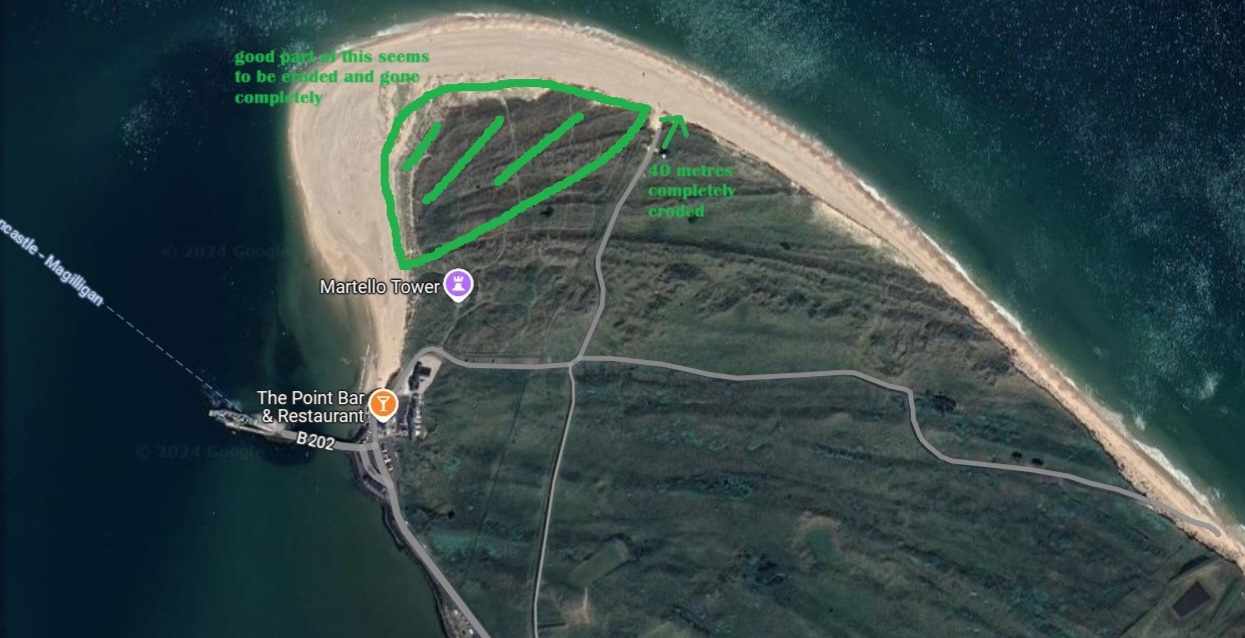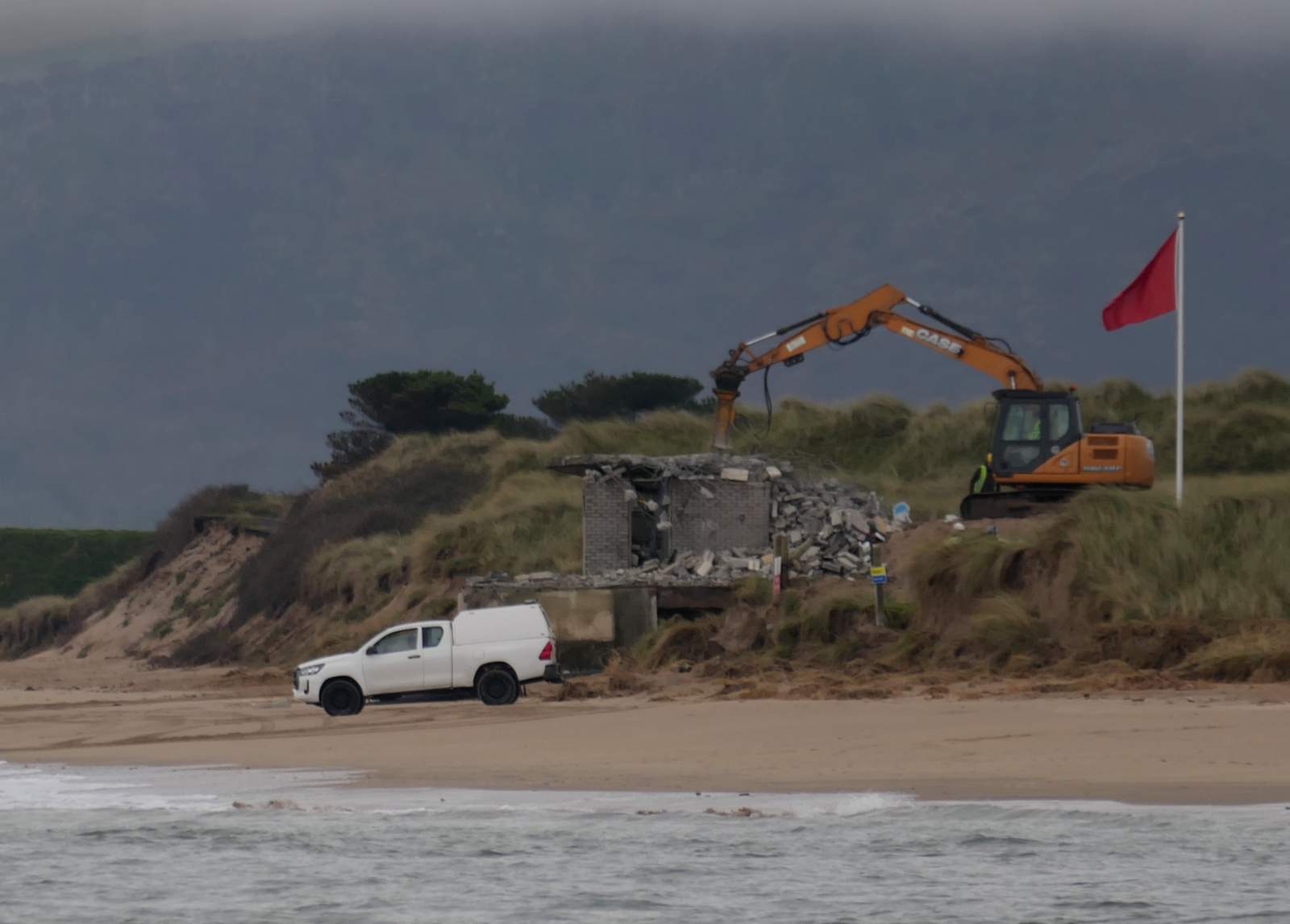
British army dismantling County Derry lookout post due to ‘significant coastal erosion’.
The British army is dismantling its lookout post at Magilligan Point in County Derry as a result of “significant [coastal] erosion” at the entrance to Lough Foyle.
A British Ministry of Defence (MOD) spokesperson revealed the move was in response to its estimate the remaining ground around the lookout post would be “eroded within the next two months”, in reply to a County Derry Post inquiry.
According to seasoned inshore fisherman, Liam O’Brien, from Greencastle in County Donegal, the “significant erosion” at Magilligan Point has been caused by the construction of the Greencastle Harbour Breakwater - directly across Lough Foyle.
Mr O’Brien said approximately 40 metres of coast had been eroded from Magilligan Point in the last year.

'Significant coastal erosion' at Magilligan point has necessitated the dismantling of British army sangar.
“In the Google Earth aerial view of the area from May 2023, the lookout post is at least 40 metres away from the water,” he said.
“However, in the photographs taken last week as its dismantling was in progress that 40 metres of land has gone - it has been eroded.
“Before the Breakwater was constructed, we were told at a meeting it would “probably” result in coastal erosion. At the time I said there was no probably about it because what you put up at this side of the river on the lough, you are going to take away on the far side because the Breakwater will direct the tide.
“I asked if a marine impact study had been done and I got no satisfactory response.
“The Breakwater is between 55 and 60 feet below the water at low tide and it extends approximately 250 metres into the channel. It is pushing the tide towards the more easily eroded Magilligan Point and has effectively developed two more tides here now - rip currents,” said Mr O’Brien.
The MOD spokesperson said: “The lookout post is an unused sangar and is being dismantled as a result of the significant erosion at Magilligan Strand. There is no evidence to suggest the erosion is linked to the building of a breakwater at Greencastle, County Donegal.
“The sangar is being dismantled as it is estimated that the ground around it will be eroded within the next two months.
“There is however no expected risk of the structure collapsing before it is dismantled.
“The Sangar will not be rebuilt,” he said.
Magilligan Strand and the British Army’s presence there is of huge importance in modern Irish history - notwithstanding the nearby Martello Tower, built during the Napoleonic Wars (1803 to 1815) to guard against possible invasion.
On Saturday, January 22, 1972 - a week before Bloody Sunday in Derry - several thousand people took part in an anti-internment march held on Magilligan Strand.
The Cain Archive recorded: “As the march neared the internment camp it was stopped by members of the Green Jackets and the Parachute Regiment of the British Army, who used barbed wire to close off the beach.
“When it appeared that the marchers were going to go around the wire, the army then fired rubber bullets and CS gas at close range into the crowd.
“A number of witnesses claimed that the paratroopers (who had been bussed from Belfast to police the march) severely beat a number of protesters and had to be physically restrained by their own officers.
“John Hume accused the soldiers of ‘beating, brutalising and terrorising the demonstrators.’”
In addition, Fifty years ago, on October 15, 1974, on the same night Republican prisoners burnt Long Kesh to the ground, the Republican prisoners in Magillligan Prison burnt the kitchen, part of the hospital and some of the huts there. Their actions were in protest at the poor conditions in which they were being kept and the ill-treatment of prisoners.

British army dismantling County Derry lookout post due to ‘significant coastal erosion’.
The County Derry Post contacted the Irish Department of Agriculture, Food and The Marine (DAFM), which was responsible for the construction of the Greencastle Harbour Breakwater.
It asked if the DAFM had conducted an analysis of how the volume and speed of the tidal flow of the Foyle might be impacted by the Breakwater, before the project went ahead.
The Department has not provided a response.
The Crown Estate, which owns the seabed of Lough Foyle was asked if it had been contacted by DAFM prior to the construction of the Greencastle Harbour Breakwater. It has not responded to the enquiry.
A spokesperson for the Loughs’ Agency, established post Good Friday Agreement to “conserve, manage and protect the Foyle and Carlingford Loughs, said: “In respect of the application for the construction of a breakwater at Greencastle, County Donegal, Loughs Agency issued a consultation response in March 2007.
"We advised that we were generally in favour of the proposals outlined within the Environmental Impact Statement.
"However, it is important to note that the monitoring of coastal erosion within Loughs Agency catchment areas is not within our statutory remit, nor is the monitoring of hydrodynamic changes within Lough Foyle.”
Subscribe or register today to discover more from DonegalLive.ie
Buy the e-paper of the Donegal Democrat, Donegal People's Press, Donegal Post and Inish Times here for instant access to Donegal's premier news titles.
Keep up with the latest news from Donegal with our daily newsletter featuring the most important stories of the day delivered to your inbox every evening at 5pm.